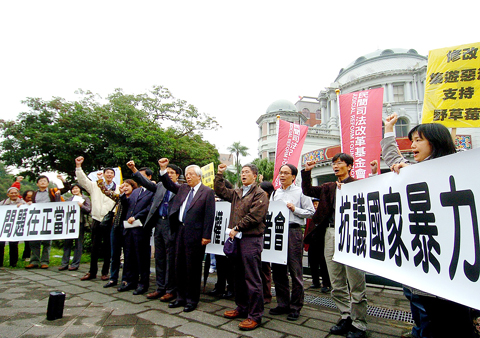At the request of civic groups and academics, the Control Yuan will launch an investigation into whether National Police Agency (NPA) and National Security Bureau (NSB) heads broke the law during the visit of Association for Relations Across the Taiwan Strait Chairman Chen Yunlin (陳雲林) and his delegation earlier this month.
Twenty-five civic groups and 218 academics filed a petition with the Control Yuan yesterday, calling for an investigation into the actions of NPA Director-General Wang Cho-chiun (王卓鈞), NSB Director Tsai Chao-ming (蔡朝明) and National Security Council Secretary-General Su Chi (蘇起).
The petitioners accused the NPA and NSB of violating civil liberties when executing “Operation Concord” to protect Chen and his delegation during their Nov. 3 to Nov. 7 visit.

PHOTO: LU CHUN-WEI, TAIPEI TIMES
Chen arrived in Taiwan to sign four agreements with Straits Exchange Foundation Chairman Chiang Pin-kung (江丙坤) aimed at enhancing cross-strait ties.
“In executing ‘Operation Concord,’ [the NSB and the NPA] violated people’s freedom of movement and the right to be at public places, taking excessive measures such as closing off the airport, public roads, sidewalks and hotels, all in the name of ‘protecting Chen’s personal safety,’” the petition said.
“In our constitutional history, the government has never closed off public spaces on such a large scale or so seriously restricted freedom of movement. The aforementioned agencies have obviously violated several laws,” it said.
The petition also cited various incidents of abuse that allegedly occurred during Chen’s stay.
In several cases, individuals wearing T-shirts calling Taiwan a sovereign country, holding the Republic of China or Tibetan flags, or shouting pro-independence slogans were forcibly removed by police and prohibited from walking past buildings in which Chen was at the time.
In other cases, a woman was taken to a police station for videotaping Chen’s convoy leaving a hotel, while several anti-China demonstrators who protested peacefully were beaten by police and severely injured.
“There should already be some mechanism in our government system — for example, prosecutors — to assess such abuses of power, but nothing has been done so far,” Yen Chueh-an (顏厥安), a National Taiwan University law professor, told a press conference outside the Control Yuan before submitting the petition.
“Sadly, nothing has happened and we suspect that something went wrong in our government system. That’s why we are taking this [petition] to the Control Yuan,” Yen said.
“We brought proof of the NPA and the NSB’s wrongdoing, including videos recorded by the media and individuals on the scene, pictures, injury reports and police reports,” said Chiu Hei-yuan (瞿海源), a sociology research fellow at Academia Sinica.
Control Yuan member Huang Huang-hsiung (黃煌雄) accepted the petition and said he would investigate.
“I will ask the concerned parties to explain what happened and summon them to appear in person if necessary,” Huang said. “If everything goes well, the investigation should be completed in three months.”
According to the Constitution, Wang, Tsai and Su could face impeachment if the Control Yuan finds them guilty.

US climber Alex Honnold is to attempt to scale Taipei 101 without a rope and harness in a live Netflix special on Jan. 24, the streaming platform announced on Wednesday. Accounting for the time difference, the two-hour broadcast of Honnold’s climb, called Skyscraper Live, is to air on Jan. 23 in the US, Netflix said in a statement. Honnold, 40, was the first person ever to free solo climb the 900m El Capitan rock formation in Yosemite National Park — a feat that was recorded and later made into the 2018 documentary film Free Solo. Netflix previewed Skyscraper Live in October, after videos

Starting on Jan. 1, YouBike riders must have insurance to use the service, and a six-month trial of NT$5 coupons under certain conditions would be implemented to balance bike shortages, a joint statement from transportation departments across Taipei, New Taipei City and Taoyuan announced yesterday. The rental bike system operator said that coupons would be offered to riders to rent bikes from full stations, for riders who take out an electric-assisted bike from a full station, and for riders who return a bike to an empty station. All riders with YouBike accounts are automatically eligible for the program, and each membership account

A classified Pentagon-produced, multiyear assessment — the Overmatch brief — highlighted unreported Chinese capabilities to destroy US military assets and identified US supply chain choke points, painting a disturbing picture of waning US military might, a New York Times editorial published on Monday said. US Secretary of Defense Pete Hegseth’s comments in November last year that “we lose every time” in Pentagon-conducted war games pitting the US against China further highlighted the uncertainty about the US’ capability to intervene in the event of a Chinese invasion of Taiwan. “It shows the Pentagon’s overreliance on expensive, vulnerable weapons as adversaries field cheap, technologically

NUMBERS IMBALANCE: More than 4 million Taiwanese have visited China this year, while only about half a million Chinese have visited here Beijing has yet to respond to Taiwan’s requests for negotiation over matters related to the recovery of cross-strait tourism, the Tourism Administration said yesterday. Taiwan’s tourism authority issued the statement after Chinese-language daily the China Times reported yesterday that the government’s policy of banning group tours to China does not stop Taiwanese from visiting the country. As of October, more than 4.2 million had traveled to China this year, exceeding last year. Beijing estimated the number of Taiwanese tourists in China could reach 4.5 million this year. By contrast, only 500,000 Chinese tourists are expected in Taiwan, the report said. The report